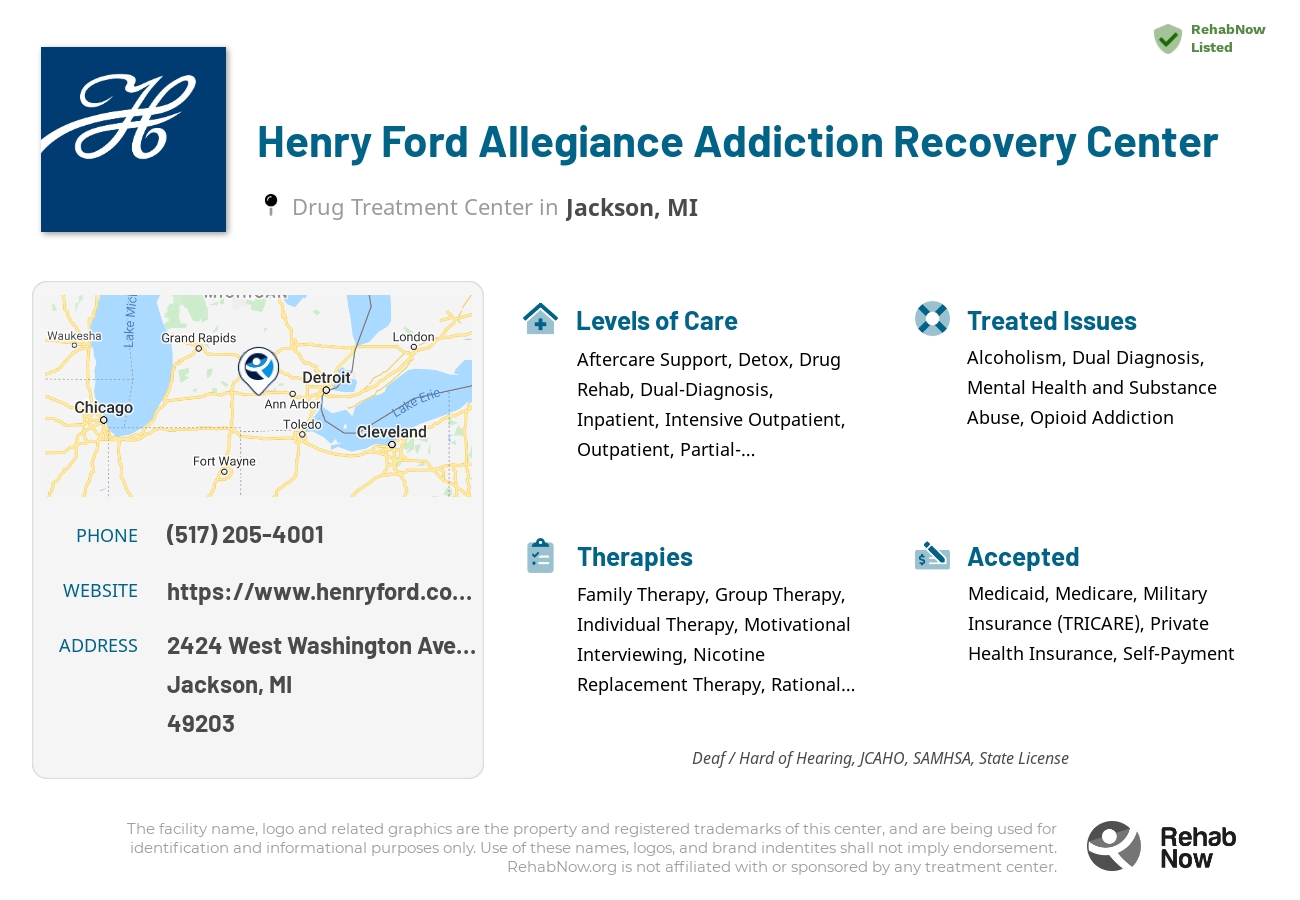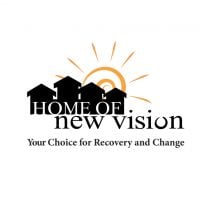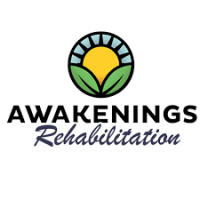Henry Ford Allegiance Addiction Recovery Center
Drug Rehab Center in Jackson, Michigan
The Henry Ford Allegiance Addiction Recovery Center in Jackson, Michigan offers outpatient care with individualized treatment plans, medication-assisted therapy, and holistic approaches for individuals struggling with addiction and substance abuse, as well as support services for their families and a mobile app for tracking recovery progress.
About Henry Ford Allegiance Addiction Recovery Center in Michigan
Henry Ford Allegiance Addiction Recovery Center, founded in 1915, is an Addiction Treatment Facility located in Jackson, Michigan. This esteemed center specializes in providing comprehensive and effective treatment for individuals suffering from alcoholism, dual diagnosis, opioid addiction, and drug addiction. With a mission to help patients achieve lasting recovery, Henry Ford Allegiance Addiction Recovery Center offers a range of services tailored to meet each individual's unique needs. The facility is accredited by the Joint Commission on Accreditation of Healthcare Organizations (JCAHO), Substance Abuse and Mental Health Services Administration (SAMHSA), and holds a state license. Additionally, they accept private health insurance, ensuring accessible and affordable treatment for those seeking help.
Henry Ford Allegiance Addiction Recovery Center offers various levels of care to suit the diverse needs of their patients. Their services include detoxification, a crucial first step in recovery, followed by inpatient treatment for those requiring intensive support and monitoring. For individuals who prefer a more flexible treatment approach, outpatient programs are available, offering flexibility in scheduling while still providing the necessary therapy and support. The center also provides partial-hospitalization, intensive outpatient, and dual-diagnosis programs for individuals facing co-occurring mental health issues alongside their addiction. Moreover, Henry Ford Allegiance Addiction Recovery Center offers comprehensive aftercare support to ensure a smooth transition and long-term success in recovery. With their commitment to evidence-based treatment, experienced professionals, and a wide range of services, Henry Ford Allegiance Addiction Recovery Center is dedicated to helping individuals overcome addiction and regain control of their lives.
Genders
Ages
Modality
Additional
Accreditations
State License
SAMHSA

JCAHO
Conditions and Issues Treated
Opioid addiction starts when a person becomes addicted to legal or illegal opioids. The addiction can happen quickly, in just a matter of days. Opioid withdrawal can be extremely uncomfortable and lead the user to continue to use even if they want to quit. Stopping using an opioid requires medical observation. Sometimes inpatient treatment with a medically supervised detox is necessary for managing the withdrawal process while learning lasting tools for maintaining recovery. Medications may be used in some cases of opioid addiction.
Opioid addiction is one of Michigan‘s most prominent forms of addiction. It’s treated by detoxifying the body so that the chemicals from the medications no longer impact them and by therapies to correct behavior and target the root of the problem.
Recovery is not simply about stopping drug use. Recovery is working with addiction while recovering mental health issues that are fueling the addiction in the first place.
Levels of Care Offered
This center offers a variety of custom treatment tailored to individual recovery. Currently available are Aftercare Support, Detox, Drug Rehab, Dual-Diagnosis, Inpatient, Intensive Outpatient, Outpatient, Partial-Hospitalization, with additional therapies available as listed below.
Detox is the first step of rehab. It involves giving a person time to get the toxins out of their body. During detox, the patient gets ill and they will often start using again to get rid of these unpleasant feelings. That’s why it’s so important to have a Jackson medical professional at Henry Ford Allegiance Addiction Recovery Center present. A Michigan medical professional will make sure patients don’t start using during detox. They will also provide medication to ease their symptoms and coach them through on a mental level.
Individuals who are suffering from severe addiction or have a high risk for dangerous health concerns are often recommended to receive inpatient treatment.
Choosing to enter an inpatient treatment program is beneficial for people who are suffering from severe addiction, or who have a high risk for dangerous health concerns.
Inpatient treatment is beneficial for:
- People who have a history of severe withdrawal.
- People who have attempted to overcome addiction on their own without success.
- People who have a history of relapse, or have recently relapsed.
- People at risk for drug overdose or withdrawal-related complications.
- People with medical conditions that are worsened by drug or alcohol use.
Addicts who need help with their addiction can enroll in an intensive outpatient program (IOP). But the patient won’t live there during treatment.
IOP involves patients visiting a medical office building regularly for therapy and other services while continuing to live their lives.
IOP is a step up from drug or alcohol detox, but it’s still a phase of recovery, not the end goal. Patients in need of IOP have many options for rehab and treatment.
Outpatient treatment is considered the lower intensity level of addiction treatment. It’s ideal for early phase addiction or lower intensity addictions. It may include weekly sessions instead of daily. It may include weekly sessions instead of daily. Peer group support, 12-step programs, and individual counseling may still be involved but at a lesser frequency than an intensive outpatient program. It is a good choice for someone who doesn’t need to go through a medically supervised detox and who has a supportive home environment. It requires motivation and dedication to commit to the program without constant monitoring.
PHP is a program where the individual is cared for in a hospital-like environment during the struggle of those symptoms, but still have some of the freedoms of an outpatient form of treatment. The individual may sleep at the facility each night, or they may sleep at home, but all have more monitoring than an outpatient treatment program typically offers. A PHP is able to live at home, attend school, work or perform other daily activities. This appeals to many families due to the ability of their loved one to still have some freedoms while also receiving treatment for their addiction.
Aftercare support should take place after outpatient treatment has ended. There are a few different types of aftercare support that patients can seek. These include 12 Step, Self-help groups (AA, NA), Therapeutic communities, Long-term, structured sober living arrangements, and Halfway houses (residential treatment centers).
Therapies & Programs
Individual therapy involves one-on-one sessions between the patient and therapist. It provides patients with a safe environment to openly discuss personal and sensitive issues with the therapist. They find the therapist as someone they can trust. Individual therapy aims to identify the core issues that would have led the patient to substance abuse and address them effectively. The therapist can develop patient-specific customized solutions through individual therapy, which aids speedier recovery.
Family therapy is a group problem-solving that aims to improve communication and relationships between the addict, their family, and sometimes friends. The main goal of family therapy for drug addiction is to create an environment where communication can occur without judgment, hostility, or blame. The therapist is with the family as they learn to communicate differently, especially with the addict when s/he is using. The family can learn to reduce their enabling behavior or rally together and support each other during tough times.
An addict’s family can play a vital part in helping them to avoid relapse because they can spot the warning signs and help them get back on track before it becomes too much of a problem. Family therapy is one of the most effective ways to help addicts stay on the path to long-term sobriety. When a drug addict decides that they want to try and get sober, it takes the support of every person they love to succeed. It can be incredibly difficult for loved ones to watch an addict go through the pain and suffering of withdrawal, but by being there with them and supporting them, they can help to make sure that the addiction never returns.
Groups typically involve meetings with other recovering addicts who can relate to one another’s experiences. They might meet in person or online and typically focus on the process of staying sober rather than overcoming a specific addiction.
In these groups managed by Henry Ford Allegiance Addiction Recovery Center, addicts can build a sense of community and develop strong emotional connections with others who understand what they are going through. These beneficial relationships can help addicts overcome their cravings and prevent relapse at any point during the recovery process.
There is hope for people who are addicted to drugs and alcohol. Cognitive Behavioral Therapy (CBT) is the solution. CBT focuses on the underlying thoughts and behaviors that caused the addiction problem in the first place and may cause a relapse. This type of psychotherapy addresses negative feelings common in substance abuse disorders. It helps to change them by restructuring thought patterns. It’s about removing negative thoughts and providing long-term benefits while promoting self-awareness, self-control, and healthy ways to respond to negative thoughts. These sessions can be done by themselves or as part of combination therapy.
REBT, or Rational Emotional Behavior Therapy, is a way of replacing negative thoughts with positive ones. It teaches people how to deal effectively with their unwanted habits and emotions. Some common problems people have are procrastination, unhealthy eating, and angry outbursts. Learning how to deal with these problems in a productive manner makes them less apt to come back.
Payment Options Accepted
For specific insurance or payment methods please contact us.
Is your insurance accepted?
Ask an expert, call (888) 674-0062
Henry Ford Health System Associated Centers
Discover treatment facilities under the same provider.
- Henry Ford Allegiance - Addiction Recovery Center in Jackson, MI
- Henry Ford Health System in West Bloomfield, MI
- Henry Ford Health Systems - Maplegrove Ctr for Chem Dependency in West Bloomfield, MI
- Henry Ford Behavioral Health - Seville in Clinton Township, MI
- Henry Ford Allegiance Neuropsychology in Jackson, MI
Learn More About Henry Ford Health System Centers
Additional Details
Specifics, location, and helpful extra information.
Jackson, Michigan 49203 Phone Number(517) 205-4001 Meta DetailsUpdated November 25, 2023
Staff Verified
Henry Ford Allegiance Addiction Recovery Center Patient Reviews
There are no reviews yet. Be the first one to write one.
Jackson, Michigan Addiction Information
Michigan has the second-highest rate of drug and alcohol abuse in the nation. Heroin is linked to more than 50% of the state's hepatitis C cases. Marijuana is the drug most often associated with crimes in Michigan, followed by methamphetamines. Opioids alone are responsible for almost 20% of all drug overdose deaths in Michigan.
In Jackson, Michigan, there are more than 40 deaths caused by drug overdoses in 2013. This adds up to about 15% of all the fatal injuries in the city. The total number of arrests for drug-related crimes in 2012 was just over 1,500. The most common drugs of abuse are heroin, LSD, marijuana, crack cocaine, and methamphetamine.
Treatment in Nearby Cities
- Plymouth, MI (50.6 mi.)
- Hancock, MI (394.0 mi.)
- Portland, MI (49.0 mi.)
- Dowagiac, MI (87.3 mi.)
- Roscommon, MI (155.9 mi.)
Centers near Henry Ford Allegiance Addiction Recovery Center
The facility name, logo and brand are the property and registered trademarks of Henry Ford Allegiance Addiction Recovery Center, and are being used for identification and informational purposes only. Use of these names, logos and brands shall not imply endorsement. RehabNow.org is not affiliated with or sponsored by Henry Ford Allegiance Addiction Recovery Center.













